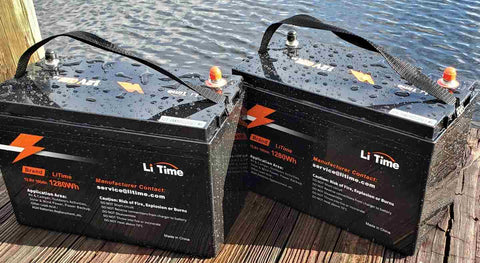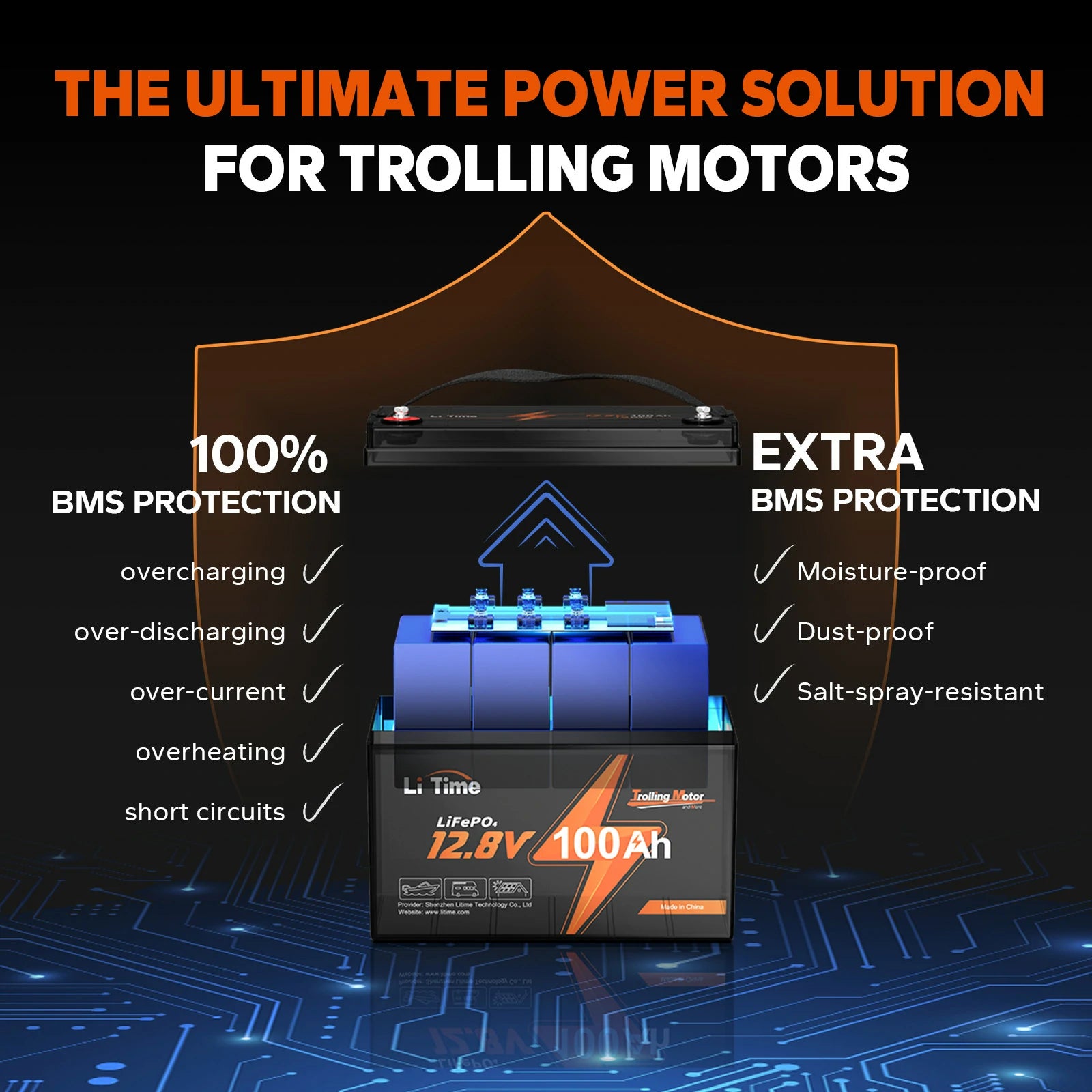Lithium batteries are widely used in various electronic devices due to their high energy density and long life. However, one common concern among users is what happens if a lithium battery gets wet. In this article, we will explore the potential risks associated with exposing lithium batteries to moisture, precautions to take, and solutions to mitigate damage.
Can Lithium Batteries Withstand Water Exposure?
The ability of lithium batteries to withstand exposure to water depends on their quality and the design implemented by the manufacturer. For instance, LiTime Batteries are fully sealed and carry an IP65 rating, making them resistant to water and capable of performing optimally even in moderately moist environments. However, prolonged exposure to high levels of moisture can lead to irreversible damage as water may penetrate the battery.

When considering other types of lithium-ion batteries, it is crucial to understand the manufacturer's specifications regarding water exposure. While most lithium batteries are sealed cells, the level of protection against water varies based on the manufacturer. The extent and duration of water exposure can significantly impact the battery's health. While many lithium batteries can endure rain or accidental splashing, it is advisable to adhere to the manufacturer's recommendations and take additional precautions against water exposure when necessary.
Despite varying degrees of water resistance among different types of lithium batteries, submerging any battery in water can cause significant damage, reducing performance or rendering the battery inoperable. Therefore, it is essential to protect batteries from excessive water exposure. While LiTime Batteries can withstand some moisture and maintain optimal functionality, it is crucial to avoid submerging any type of lithium battery in water to prevent potential damage.
What is an IP65 Rating?
An IP65 rating is a standard used to classify the degree of protection provided by an electrical enclosure against the intrusion of solid objects, dust, and water. The "IP" in IP65 stands for "Ingress Protection," and the "65" indicates the level of protection.
Specifically, an IP65 rating signifies the following:
- Solids: The "6" in the rating indicates that the enclosure is dust-tight, meaning it provides complete protection against the ingress of dust and other solid particles.
- Liquids: The "5" in the rating indicates that the enclosure is protected against low-pressure water jets from any direction. This means it is resistant to water projected by a nozzle (6.3 mm) against the enclosure from any direction without harmful effects.
In practical terms, a device or enclosure with an IP65 rating is well-suited for outdoor use or environments where exposure to dust and water is a concern. It provides a high level of protection against these elements, making it suitable for a wide range of applications, including outdoor lighting, electrical enclosures, and certain types of consumer electronics.
What Happens When Lithium Batteries Encounter Water?
The impact of water exposure on lithium batteries largely depends on the quantity and duration of exposure. In the case of LiTime Batteries, their sealed design offers protection against occasional water exposure, safeguarding critical battery components from harm. However, prolonged exposure to water can lead to damage, particularly affecting sensitive components such as the battery terminals. If water reaches the internal elements of the battery, it can trigger potentially hazardous chemical reactions.
Submersion of a lithium battery in water can create a pathway for current flow between the terminals, leading to unintentional discharge and potential damage to the battery. Therefore, while LiTime Batteries and similar high-quality lithium batteries can endure some moisture and maintain functionality, it is crucial to avoid prolonged exposure to water to ensure the longevity and safety of the battery.
How Salt Water Impact a Lithium Battery?
Exposure to salt water can have detrimental effects on lithium batteries. When a lithium battery comes into contact with salt water, several issues can arise:
- Corrosion: Salt water is highly corrosive due to the presence of dissolved salts, which can lead to the corrosion of the battery's terminals and other metallic components. This corrosion can compromise the electrical conductivity of the battery and lead to a decrease in performance.
- Short circuits: Salt water is a good conductor of electricity. If it penetrates the battery casing, it can create a direct path for the flow of electricity, potentially causing a short circuit. This can lead to overheating, leakage, or even fire, posing significant safety risks.
- Chemical reactions: The presence of salt water can trigger chemical reactions within the battery, potentially leading to the formation of harmful compounds and accelerating the degradation of internal components.
- Reduced lifespan: Prolonged exposure to salt water can significantly reduce the lifespan of a lithium battery. The corrosive nature of salt water and the potential for internal damage can lead to premature failure of the battery.
To lower the damage of salty water to lithium batteries, it’s recommended to try LiTime Trolling Motor Lithium batteries when you are in marine applications since the batteries are equipped with upgraded BMS with moisture, dust, water and salt spray resistance for reliability in humid environments.

Suggest reading: What Size Battery for My Trolling Motor
Can You Recharge Wet Lithium Batteries?
It's ideal for your battery to stay dry. If it comes into contact with small amounts of water or is exposed to a slightly moist environment, recharging it should not pose a problem. However, if the battery is in water or submerged, never try to recharge it. It's recommended to use LiTime Waterproof lithium battery charger to safely charge.

Attempting to recharge a submerged lithium battery can lead to several hazardous outcomes:
- Short circuits: The presence of moisture or liquid increases the risk of short circuits within the battery, which can lead to overheating, leakage, or even fire.
- Corrosion: If the battery terminals or internal components have been exposed to moisture, attempting to recharge the battery can accelerate corrosion and further damage the battery.
- Electrical hazards: Recharging a wet lithium battery can pose significant electrical hazards, as the presence of moisture can create a path for electricity to flow unpredictably, potentially causing injury or damage to the charging equipment.
Can I Leave Lithium Batteries Outside?
Storing lithium batteries outdoors poses no inherent risk as they are fully sealed, protecting their internal components. Moreover, LiFePO4 batteries are designed to function across a wide range of temperatures, enabling them to operate effectively in diverse weather conditions. Considering these factors, occasional outdoor storage of lithium batteries should not cause damage.
Nevertheless, prolonged exposure to the elements should be avoided to preserve the longevity of the batteries. Shielding them from rain, wind, water, and extreme temperatures is crucial to maintain optimal operation, ultimately saving both money and inconvenience in the long term. When you've invested time and money in your batteries, ensuring their longevity is a priority.
What Precautions Should I Take to Prevent Lithium Batteries Getting Wet?
To safeguard your lithium batteries from moisture, consider the following precautions:
- Storage: Store batteries in a dry and secure location, away from areas prone to water exposure.
- Sealing: Ensure that battery compartments are properly sealed in devices or storage containers to prevent water ingress.
- Protection: Use waterproof cases or covers when carrying or storing batteries in environments where moisture is a concern.
- Avoid submersion: Never allow lithium batteries to be submerged in water or exposed to excessive moisture.
- Regular checks: Periodically inspect battery enclosures and seals for any signs of wear or damage that could compromise their waterproofing.
By taking these precautions, you can help prevent moisture from compromising the integrity and functionality of your lithium batteries.
How to Make Your Batteries Waterproof
If you expect your lithium batteries to frequently encounter significant moisture, it's important to waterproof them. Along with secure, dry-box-style battery compartments, you can tightly wrap or coat the batteries with waterproof materials like urethane waterproof coatings, silicone, or rubberized paints. These materials provide an added layer of protection for your lithium battery, as long as the terminals and other critical parts of the battery remain accessible and functional.
Tips: Consider using the LiTime Group 24/27/31 Battery Box to keep your batteries warm and dry. These enclosed containers safeguard the battery from water and other hazards during transportation. Typically, the box includes ports that allow users to draw power and charge the battery without needing to remove it. These boxes provide peace of mind to ice fishermen, regardless of the extreme conditions they may encounter.
How Secure Are Lithium Batteries on a Boat?
Under normal circumstances and with basic maintenance, lithium marine batteries are highly safe for use on the water. In fact, they are the preferred choice for those requiring marine batteries with ample storage, rapid charging, and the ability to function in almost any condition. Compared to lead-acid batteries, lithium batteries offer more adaptable mounting options and pose less risk if rough seas are encountered.
Lithium batteries are completely sealed and have a reduced risk of water-related damage or problems. While certain lithium battery chemistries are more volatile and prone to thermal runaway, lithium-iron phosphate (LiFePO4) is exceptionally safe and stable. With LiTime trolling motor series powering your marine or sailing vessel, you can be confident that you have the safest power source available.
Don't Worry If Your Lithium Batteries Get Wet
Can lithium batteries handle being wet? The answer is yes! LiTime Batteries are IP65 rated, making them splashproof and water-resistant. Thanks to their sealed design, they can endure direct exposure to water without suffering severe or lasting damage.
While prolonged water exposure can be harmful, taking the necessary precautions will ensure your batteries remain fully functional. With superior performance, unmatched quality, and exceptional safety ratings, LiTime LiFePO4 batteries continue to be the top choice for marine applications.








